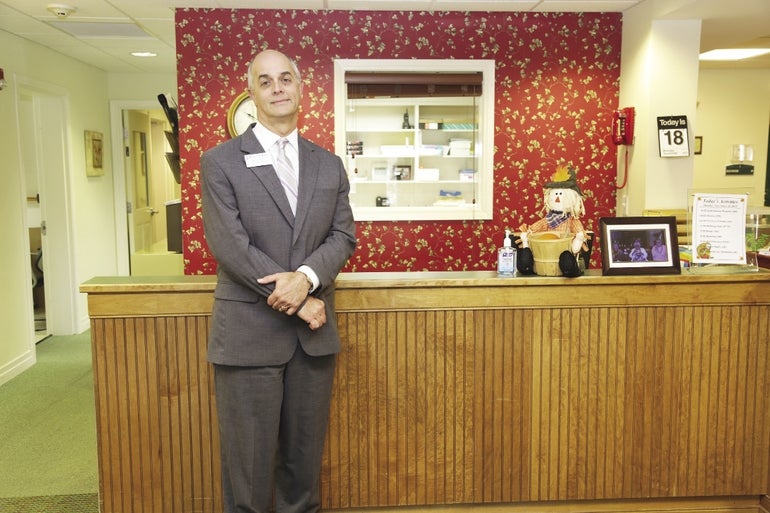This fall, Whitcomb House, a 55-unit, family-owned assisted-living residence in Milford, was quietly acquired by one of the nation’s largest owners and operators of such facilities. The acquisition was the first in Massachusetts for Texas-based Capital Senior Living, one of a handful of big, publicly traded companies in the assisted-living industry.
The decision to buy Whitcomb House reflects Capital Senior Living’s efforts to increase its market share in a field dominated by small regional players. Other big operators are making acquisitions in Central Massachusetts too. But that doesn’t mean local companies are feeling the squeeze. With all kinds of housing markets swinging back into growth mode, and with baby boomers getting older every day, there seems to be enough room in the assisted-living industry for everyone’s slice of the pie to grow.
Capital Senior Living (CSL) has been traveling a serious growth path in recent years, going from 50 residences and revenue of $192 million in 2009 to 98 residences and $311 million in 2012, and it has already added 10 more facilities this year. CSL’s corporate office didn’t return calls for this story, but in a recent SEC filing the company wrote that it plans to keep pursuing acquisitions.
The company, which said it spent $31.8 million to buy both Whitcomb House and a facility in Wisconsin, ended up buying the Milford residence partly because the family that owned it was ready to sell.
“The former owners decided that they were retirement age and would like to enjoy their retirement,” said Mark Cohen, executive director of the residence.
Cohen said little should change in the way Whitcomb House operates day to day. Its 60 employees—who do everything from helping residents with their medical needs to changing light bulbs and making dinner—will remain, and it will do business just as it always did.
“Who we are is what made us attractive to Capital,” Cohen said. “They clearly think we’re doing a good job and we’re successful, we’re profitable.”
Daniel Bernstein, an analyst who follows CSL for Stifel, Nicolaus & Co., said large operators of assisted-living facilities need to make sure they have staff onsite who know the local community. But he said they can also benefit from economies of scale that come with operating dozens of residences. And he said the best model for efficiency is to have a number of locations in one region. So far, he said, CSL has a strong presence in Texas and the Midwest, but less in the Northeast.
“I assume if they have bought one property in Massachusetts they may be looking elsewhere in Massachusetts,” he said.
More Buyers Lining Up?
Meanwhile, other big operators are also interested in Massachusetts. The nation’s second largest assisted-living operator, Seattle-based Emeritus Senior Living, which already has a location in Auburn, is building a new residence in Franklin that’s scheduled to open in the spring. The largest company, Sunrise Assisted Living, has locations in Leominster and Wayland.
But it’s not just the biggest companies that are growing. Benchmark Senior Living, a Wellesley-based company with 45 locations in New England, including in Leominster, Shrewsbury and Worcester, recently acquired communities in Franklin and Acton. Senior Living Residences, based in Boston with 12 residences, including one in Ayer and another in Hopkinton, is building a new facility in Milford, on the other side of town from Whitcomb House, that will open Jan. 2. And Burlington-based Northbridge Cos. with eight existing facilities, is building a residence in Wayland, as well as two others on the Massachusetts coast.
“People definitely believe in assisted living in New England,” said Sharon Ricardi, senior vice president of the Northbridge Cos.
Ricardi said the area is attractive to companies of all sizes thanks partly to the relatively high incomes in the area. Most assisted-living costs are paid out of pocket since they’re generally not covered by programs like Medicare and Medicaid. Ricardi said another factor is that highly educated, high-paid professionals in communities like Wayland are less likely to take time off to care for aging parents than people in lower-income brackets, making professional care more of a necessity.
Operators said it’s not just the number of senior housing units that are growing. These days, seniors are entering assisted living at more advanced ages than they did a decade ago, so they tend to need more services. Many facilities now have separate “memory care” units for residents with conditions like Alzheimer’s disease.
Jennifer LaCroix, executive director of Senior Living Residences’ new Milford location, Cornerstone at Milford, said 25 of its 85 apartments will be part of the company’s Compass Memory Support program. So far, she said, about half of the deposits that have been put down are for those units.
“Obviously there is a demand in the market for quality memory care,” she said.
Nationwide, construction of senior housing dropped sharply along with the rest of the housing market in 2008, but it has now returned to pre-recession levels, according to the National Investment Center for the Senior Housing & Care Industry. More than 23,000 units were built between the second quarter of 2012 and first quarter of 2013.
In Massachusetts, about five facilities are opening this year alone, and next year will probably see five to eight more opening their doors, according to Emily Meyer, president of the Massachusetts Assisted Living Facilities Association. She said the aging of baby boomers and the rebounding economy have contributed to the growth.
“Obviously there’s a demand, because people are building,” she said.

